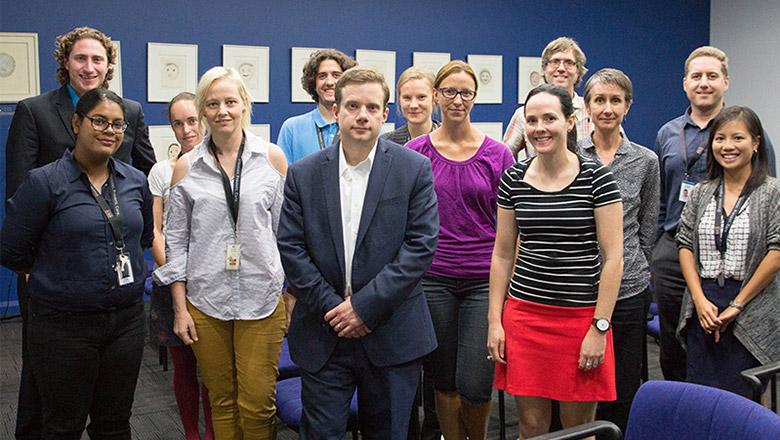Search
Showing results for "Au"
Research
Nature Connection: Providing a Pathway from Personal to Planetary HealthThe vast and growing challenges for human health and all life on Earth require urgent and deep structural changes to the way in which we live. Broken relationships with nature are at the core of both the modern health crisis and the erosion of planetary health. A declining connection to nature has been implicated in the exploitative attitudes that underpin the degradation of both physical and social environments and almost all aspects of personal physical, mental, and spiritual health.

News & Events
New study shows alcohol use ‘common’ during pregnancyThe Kids Research Institute Australia's Professor Carol Bower is not surprised by new research that shows alcohol use in pregnancy is 'common'.

News & Events
New collaborations to find better treatments for young people with depressionThe Kids Research Institute Australia welcomed Dr Paul Croarkin from the Mayo Clinic in the US to share his work on understanding and treating depression in young people.
Research
Cord blood t cells expressing high and low pkcζ levels develop into cells with a propensity to display th1 and th9 cytokine profiles, respectivelyow Protein Kinase C zeta (PKCζ) levels in cord blood T cells (CBTC) have been shown to correlate with the development of allergic sensitization in childhood. However, little is known about the mechanisms responsible. We have examined the relationship between the expression of different levels of PKCζ in CBTC and their development into mature T cell cytokine producers that relate to allergy or anti‐allergy promoting cells.

News & Events
DiabHQ is on the wayOver the coming months, WA children living with diabetes will be given the opportunity to participate in DiabHQ, an innovative new data platform.

News & Events
Keeping on track over the summer breakSwimming safety Remember that your pump should not be disconnected for more than two hours at a time — if you disconnect your pump for swimming,

News & Events
Sleepovers and diabetesLove them or hate them, but sleepovers are a popular pastime for children. Understandably, parents of children living with type 1 diabetes might be hesitant to leave them in someone else’s care for an extended period, but there are ways to ensure that everyone is prepared for a safe experience.
Research
Genome-Wide Analyses of Vocabulary Size in Infancy and Toddlerhood: Associations With Attention-Deficit/Hyperactivity Disorder, Literacy, and Cognition-Related TraitsThe number of words children produce (expressive vocabulary) and understand (receptive vocabulary) changes rapidly during early development, partially due to genetic factors. Here, we performed a meta-genome-wide association study of vocabulary acquisition and investigated polygenic overlap with literacy, cognition, developmental phenotypes, and neurodevelopmental conditions, including attention-deficit/hyperactivity disorder.
Research
Reliability, Validity and Acceptability of the PEDI-CAT with ASD Scales for Australian Children and Youth on the Autism SpectrumThe PEDI-CAT (ASD) is used to assess functioning of children and youth on the autism spectrum; however, current psychometric evidence is limited. This study aimed to explore the reliability, validity and acceptability of the PEDI-CAT (ASD) using a large Australian sample.
Research
Sex-Specific Effects of Birth Weight on Longitudinal Behavioral Outcomes: A Mendelian Randomization Approach Using Polygenic ScoresIt is unclear whether sex differences in behavior arising from birth weight (BW) are genuine because of the cross-sectional nature and potential confounding in previous studies. We aimed to test whether sex differences associated with BW phenotype were reproducible using a Mendelian randomization approach, i.e., association between polygenic score (PGS) for BW and behavior outcomes across childhood and adolescence.
